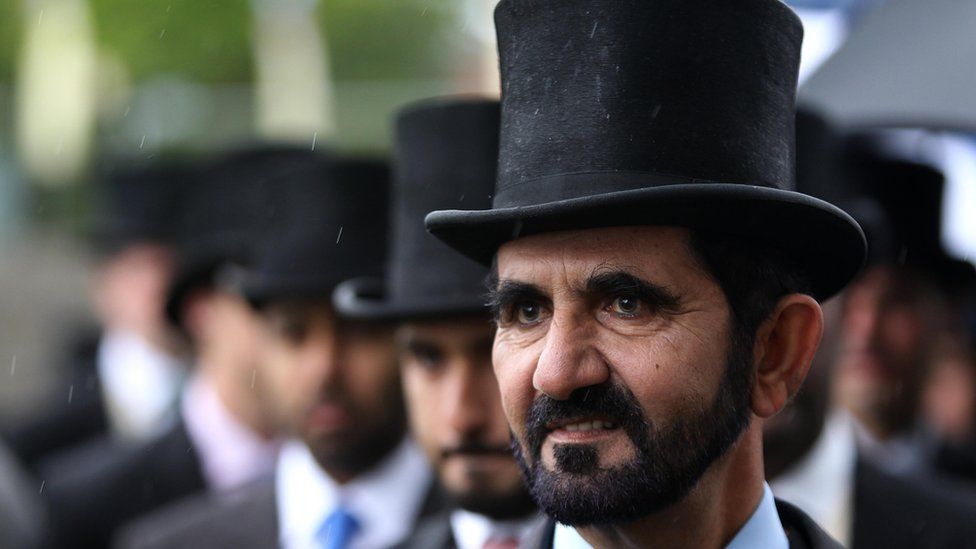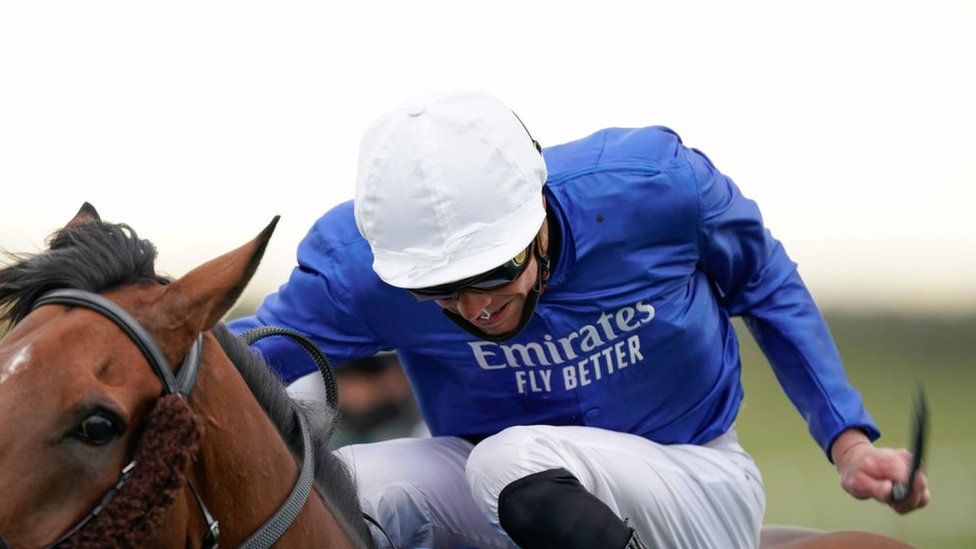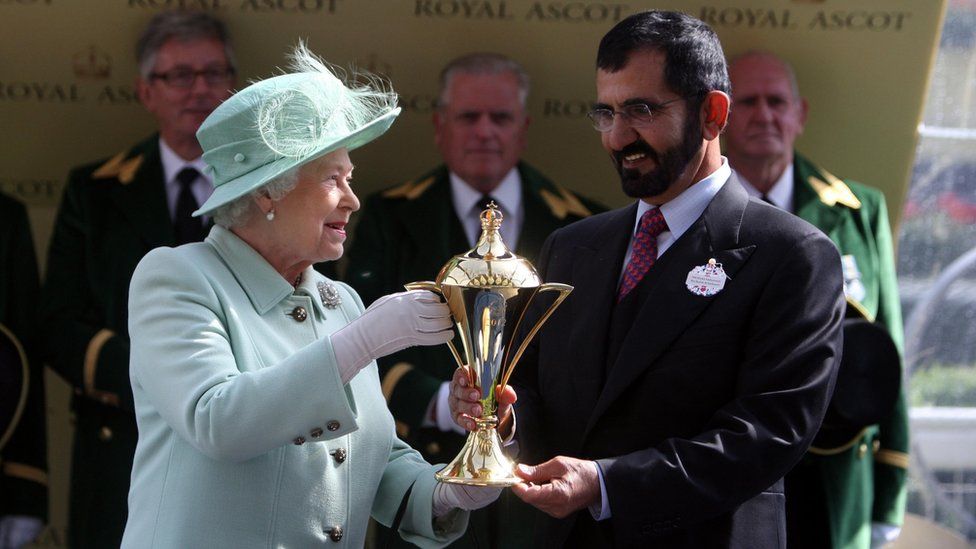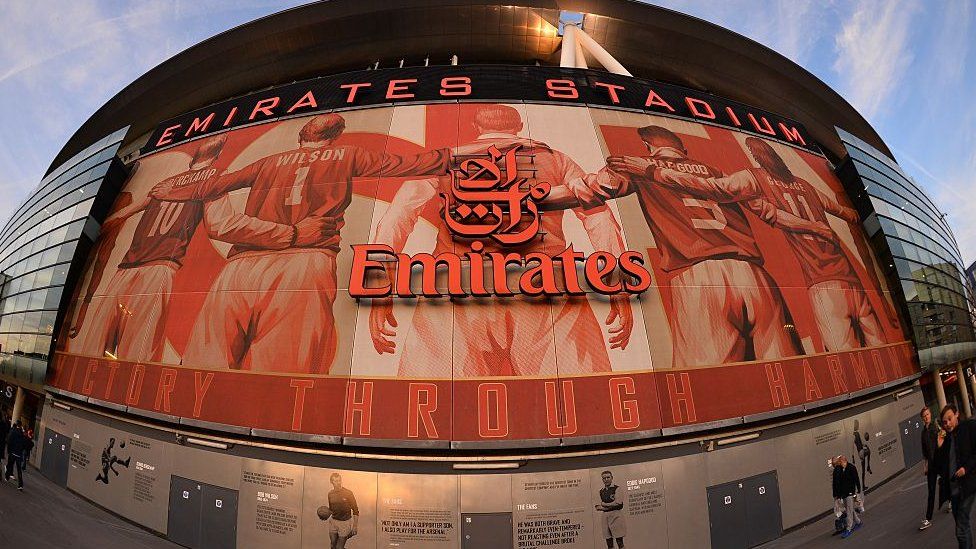
The revelation on Panorama this week that Dubai's Princess Latifa accused her father of holding her hostage in the city since she tried to flee in 2018 has the potential to create diplomatic tensions between the UK and the United Arab Emirates, a key strategic ally.
Sheikh Mohammed bin Rashid Al Maktoum has said he was acting in his daughter's best interests, and the royal family insist she was brought back to Dubai in a "rescue mission".
The UAE have previously said Princess Latifa was safe in the care of family.
But this controversy has left British horse-racing facing some deeply uncomfortable questions.
Over the past 40 years, Sheikh Mohammed has become synonymous with the sport, its most prominent and influential owner.
Indeed, it has become very hard for many in British racing to imagine the sport here without him.
The royal blue silks of Godolphin - the illustrious and hugely successful racing and bloodstock operation he founded and owns - are a constant presence on racecourses during the flat season.
Many jobs are thought to depend on Sheikh Mohammed's investment, especially in Newmarket - where Godolphin and his Dalham Hall breeding operation are based. More than 130 of his horses are trained here in Britain, with many of his millions spent on yearlings at the Tattersalls auction.

This week's allegations have renewed scrutiny on the sport's links with him.
But at a time when racing's finances are already under huge strain due to the pandemic, and fears that possible new affordability checks on gamblers could cost the industry more than £60m, many are loathe to do or say anything that could push the 71 year-old away.
It is perhaps unsurprising therefore, that neither Godolphin, nor the sport's governing body - the British Horseracing Authority (BHA), nor the Jockey Club - of which the sheikh is an honorary member, have made any comment since Panorama was aired.
But this is not the first time that British racing has faced tough questions over its association with the sheikh.
Last March, after hearing extensive witness statements over a period of time, the family division of the High Court found Sheikh Mohammed to have been responsible for a campaign of intimidation against his former wife Princess Haya and for the abduction and forced return of two of his daughters from a different marriage - including Princess Latifa.
The sheikh insisted at the time that, as a head of government, he was not able to participate in the court's fact-finding process, resulting in a judgement that "inevitably only tells one side of the story". He denied the allegations.
But the damage had been done. Previously, the Queen had invited the sheikh to join her in the royal box, and even share her carriage at Royal Ascot.
Following the scandal, she reportedly decided she would not be photographed with him again, despite their shared love of racing.
With the sport only continuing behind closed doors since March, any attempt at distancing has yet not been tested, with any awkward potential meetings so far avoided.
The problems for racing do not stop there.
The BHA's rules for assessing the suitability of owners includes the following: "The criteria to which the authority will have regard in assessing honesty and integrity, include… whether the applicant has been the subject of any adverse finding by a judge in any civil proceedings."
The authority, which is meant to regulate the sport, refuses to say whether an investigation has been launched into the sheikh in the wake of last year's judgement, but insiders say the governing body's "honesty and integrity" criteria are only part of what it considers when assessing the suitability of owners.

The distinct sense from within racing is that with these latest allegations relating to overseas matters involving a head of state of one of the UK's strategic partners and purchaser of arms exports in the Middle East, and with the government referring the matter to the UN, it is unfair to expect the sport to make a stand and speak out against one of its most important benefactors.
Others however, disagree.
"No matter how much money he pays to race his horses, no respectable race should touch Dubai ruler Sheikh Mohammed al-Maktoum until he releases his daughter" tweeted Kenneth Roth, the executive director of Human Rights Watch, this week.
Beyond racing
Despite such views, racing is unlikely to cut ties with the sheikh any time soon.

Indeed, on Saturday alone, in a sign of just how extensive his investment in the sport has become, as many as 27 Godolphin horses are scheduled to race at seven meetings across four countries.
The ruler of Duabi's sporting connections in Britain extend beyond racing.
The airline Emirates, which he launched, has a shirt sponsorship deal with Arsenal, worth £200m over four years.
It has naming rights to the club's stadium, along with Glasgow's Commonwealth Arena, and Lancashire cricket club's Old Trafford. Emirates also became the first ever title sponsor of the FA Cup in 2015.
But pressure is now mounting on racing in particular to reconsider a relationship that has been hugely lucrative, but which is becoming increasingly controversial.
https://ift.tt/3k15Kbi
Sport
Bagikan Berita Ini














0 Response to "What does Princess Latifa case mean for British sport? - BBC News"
Post a Comment